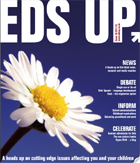
click above to browse
through
the current issue


Want to see your child's
work in print? The winner
will receive a �25 book voucher.
Email:
[email protected]
FERTILITY HOPE LIES IN STEM CELLS
Doctors have discovered a way to create eggs using stem cells,
reports Richard Alleyne, Science correspondent in The Daily
Telegraph and this stem cell treatment may “allow women to delay
menopause and replenish the supply of fresh eggs in infertile
women,” adds Steve Connor of The Independent.
Four years ago, US scientists discovered that it was possible to
get stem cells from adult women’s ovaries and grow them into
mature egg cells. Up until then, it had been widely believed that
a woman was born with a finite lifetime store of about 2 million
egg-producing follicles, falling to 400,000 by puberty and at the
menopause too few eggs to permit fertility.
In the recent Chinese research, scientists took female germline
stem cells from the ovaries of mice, grew them in a laboratory for
6 months and transplanted them into infertile mice. These mice
went on to give birth to healthy offspring.
Stem cell treatment may “allow women to delay
menopause and replenish the supply of fresh eggs
in infertile women”
Dr Wu, leading the team of scientists explains in his findings
published in Nature Cell Biology journal that the technique: “would
work in humans because we share the same ‘female germline
stem cells’. These cells can be used to extend female reproductive
lifespan . . . or be used in the treatment of infertility.”
Quoted in The Independent, Professor Robin Lovell-Badge, of the
Medical Research Council’s National Institute for Medical Research,
said that if the results are confirmed: “it could provide a means to
restore fertility to women who have few eggs or who have had to
undergo cancer treatments, by isolating these cells, expanding
their numbers ... and keeping them frozen until needed for IVF.”
The NHS advises: “Further research is needed to confirm the
study’s findings and to determine whether humans also have this
type of cell in their ovaries after birth. Until then, it is not possible to
say whether a similar technique could be used to treat human
female infertility. It is certainly too early to suggest that an infertility
‘cure’ for women is on the way on the basis of this research.”
But it’s a start . . .
It is too early to suggest that an infertility ‘cure’
for women is on the way
/
|

